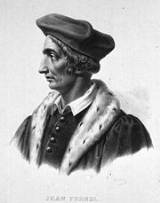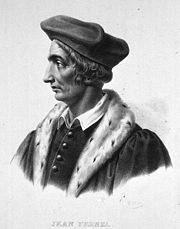
Jean Fernel
Encyclopedia

France
The French Republic , The French Republic , The French Republic , (commonly known as France , is a unitary semi-presidential republic in Western Europe with several overseas territories and islands located on other continents and in the Indian, Pacific, and Atlantic oceans. Metropolitan France...
physician
Physician
A physician is a health care provider who practices the profession of medicine, which is concerned with promoting, maintaining or restoring human health through the study, diagnosis, and treatment of disease, injury and other physical and mental impairments...
who introduced the term "physiology
Physiology
Physiology is the science of the function of living systems. This includes how organisms, organ systems, organs, cells, and bio-molecules carry out the chemical or physical functions that exist in a living system. The highest honor awarded in physiology is the Nobel Prize in Physiology or...
" to describe the study of the body's function. He was the first person to describe the spinal canal
Spinal canal
The spinal canal is the space in vertebrae through which the spinal cord passes. It is a process of the dorsal human body cavity. This canal is enclosed within the vertebral foramen of the vertebrae...
. The lunar crater Fernelius
Fernelius (crater)
Fernelius is a lunar impact crater located in the southern highlands just to the north of the walled plain Stöfler. The crater Kaiser is located next to the northwest rim of Fernelius. To the north-northwest are the craters Nonius and Walther...
is named after him.
Fernel suggested that taste buds are sensitive to fat, an idea which only recently has been shown to be correct.
He was born at Montdidier, and after receiving his early education at his native town, entered the College of Sainte-Barbe, Paris
Paris
Paris is the capital and largest city in France, situated on the river Seine, in northern France, at the heart of the Île-de-France region...
. At first he devoted himself to mathematical and astronomical studies; his Cosmotheoria (1528) records a determination of a degree of arc of the meridian, which he made by counting the revolutions of his carriage wheels on a journey between Paris and Amiens
Amiens
Amiens is a city and commune in northern France, north of Paris and south-west of Lille. It is the capital of the Somme department in Picardy...
.
His works on mathematical and astronomical subjects also include Monalosphaerium(1526), and De proportionibus (1528).
But from 1534 he gave himself up entirely to medicine, in which he graduated in 1530. His extraordinary general erudition, and the skill and success with which he sought to revive the study of the old Greek physicians, gained him a great reputation, and ultimately the office of physician to the court. He practised with great success, and at his death at Fontainebleau
Fontainebleau
Fontainebleau is a commune in the metropolitan area of Paris, France. It is located south-southeast of the centre of Paris. Fontainebleau is a sub-prefecture of the Seine-et-Marne department, and it is the seat of the arrondissement of Fontainebleau...
in 1558 left behind him an immense fortune.
His medical works include: De naturali parte medicinae (1542), De vacuandi ratione (1545), De abditis rerum causis (1548), and what has been called his "crowning work", Universa Medicina, comprising three parts, the Physiologia (developed from the De naturali parte), the Pathologia, and the Therapeutice.
External links
- Clinical Cardiology: Fernel
- Jean Francois Fernel: Biography
- Jean Fernel by Victor de Beauvillé (in French)

